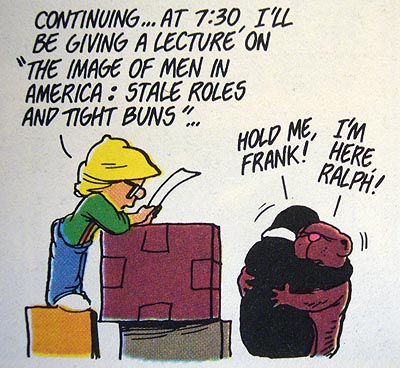Berke Breathed (1983):

Katie Roiphe (2010):
[T]he sexism in the work of the heirs apparent is simply wilier and shrewder and harder to smoke out. What comes to mind is Franzen’s description of one of his female characters in The Corrections: “Denise at 32 was still beautiful.” To the esteemed ladies of the movement I would suggest this is not how our great male novelists would write in the feminist utopia.
The younger writers are so self-conscious, so steeped in a certain kind of liberal education, that their characters can’t condone even their own sexual impulses; they are, in short, too cool for sex. [Oh, come on.] Even the mildest display of male aggression is a sign of being overly hopeful, overly earnest or politically untoward. For a character to feel himself, even fleetingly, a conquering hero is somehow passé.
More precisely, for a character to attach too much importance to sex, or aspiration to it, to believe that it might be a force that could change things, and possibly for the better, would be hopelessly retrograde. Passivity, a paralyzed sweetness, a deep ambivalence about sexual appetite, are somehow taken as signs of a complex and admirable inner life.
Male writers aren’t the only ones being dishonest. Roiphe is hedging her bets here and ends up being untruthful. Sensitive hetero guys think being a hetero guy is sexist. They think being a guy is sexist – that the true and ultimate nature of humankind is that of the enlightened liberal female. Guys like these end up as sensitive writers, not bricklayers. Who do you think gives a girl a better rogering? (Just the word “girl” is sexist.)
What’s almost as pointless as a bottom with nine inches uncut? A novelist with nine inches uncut.
Meanwhile, pace Michael Cunningham, sex is difficult to write about because “the English language actually deserts you.”